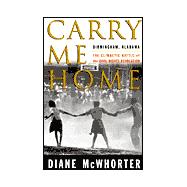A major work of history, investigative journalism that breaks new ground, and personal memoir, Carry Me Home is a dramatic account of the civil rights era's climactic battle in Birmingham, as the movement led by Martin Luther King, Jr., brought

Note: Supplemental materials are not guaranteed with Rental or Used book purchases.
Purchase Benefits
What is included with this book?
A major work of history, investigative journalism that breaks new ground, and personal memoir, Carry Me Home is a dramatic account of the civil rights era's climactic battle in Birmingham, as the movement led by Martin Luther King, Jr., brought
| Preface | 15 | (4) | |||
| Introduction: September 15, 1963 | 19 | (12) | |||
| Part I: Precedents, 1938-1959 | |||||
|
31 | (25) | |||
|
56 | (28) | |||
|
84 | (27) | |||
|
111 | (38) | |||
| Part II: Movement, 1960-1962 | |||||
|
149 | (30) | |||
|
179 | (21) | |||
|
200 | (36) | |||
|
236 | (23) | |||
|
259 | (23) | |||
|
282 | (21) | |||
| Part III: The Year of Birmingham, 1963 | |||||
|
303 | (20) | |||
|
323 | (15) | |||
|
338 | (13) | |||
|
351 | (14) | |||
|
365 | (14) | |||
|
379 | (17) | |||
|
396 | (15) | |||
|
411 | (12) | |||
|
423 | (18) | |||
|
441 | (14) | |||
|
455 | (11) | |||
|
466 | (11) | |||
|
477 | (10) | |||
|
487 | (10) | |||
|
497 | (12) | |||
|
509 | (10) | |||
|
519 | (12) | |||
|
531 | (13) | |||
|
544 | (15) | |||
|
559 | (12) | |||
| Epilogue | 571 | (17) | |||
| Abbreviations Used in Source Notes | 588 | (3) | |||
| Notes | 591 | (70) | |||
| Selected Bibliography | 661 | (9) | |||
| Acknowledgments | 670 | (5) | |||
| Index | 675 |
The New copy of this book will include any supplemental materials advertised. Please check the title of the book to determine if it should include any access cards, study guides, lab manuals, CDs, etc.
The Used, Rental and eBook copies of this book are not guaranteed to include any supplemental materials. Typically, only the book itself is included. This is true even if the title states it includes any access cards, study guides, lab manuals, CDs, etc.